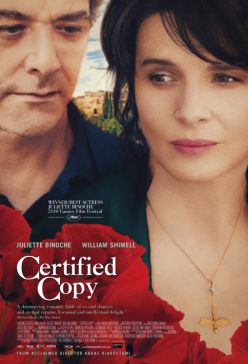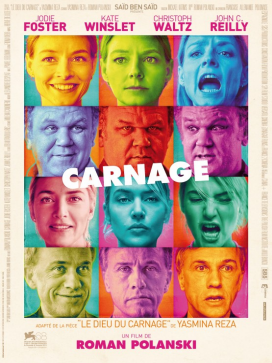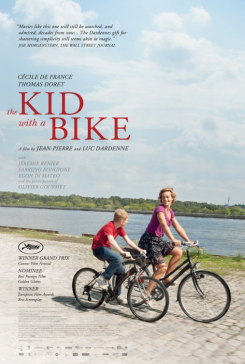Print Edition: April 11, 2012
It’s easy to turn the discussion of the upcoming summer movie season into a rant or a warning or some other variant of a laundry list of complaints. But rather than pan a blockbuster or decry the next slate of sequels, the following is the case for something. These movies never made it to Abbotsford/Mission/Langley theatres this year, but that’s not based on the perceived quality or ability of them to stand as entertainment, rather that three out of the four are in a foreign language and none of them fit into an advertising agency’s dream of an easy sell. But surely that isn’t a problem for the average university student. This isn’t an attempt to steer you away from the multiplex, but an attempt to recommend something that, somewhere in between the superheroes, invasions and romances, you might consider. These are, after all, in some ways (in order) a “relevant” political satire, a romantic journey of confusion, a grotesque comedy, and an updated fairytale – though as you’ll (hopefully) see, that’s not all they are.
The Time That Remains
 Palestinian director Elia Suleiman’s The Time That Remains travels through some of the most important moments in the long Israel-Palestine conflict, but this is hardly just a look or critique. Unlike many movies that attempt to make a point or take a stance when commenting on conflicts, The Time That Remains, while still conveying the mood of the decades of tension, does so through humour more than it does by showing atrocities. Suleiman’s film takes place from his own perspective as a child and continues through the years, but isn’t reduced to a simple autobiographical memory. The Time That Remains is marked by meticulous shots of both the perilous dealings and escapes of Suleiman’s father and, as the movies progresses, painfully funny scenes which both acknowledge the weight of the reality of the circumstances in the region and make light of the absurdity of the rules and oppression that have marked Suleiman’s life. It bears some resemblance to the comedy of Jacques Tati, only Suleiman observes the chaos created by the conflict rather than plays a role in creating it. It is a staggering, beautiful film that both mourns what has passed and brings to the surface the idiosyncratic lives and dreams that go on underneath.
Palestinian director Elia Suleiman’s The Time That Remains travels through some of the most important moments in the long Israel-Palestine conflict, but this is hardly just a look or critique. Unlike many movies that attempt to make a point or take a stance when commenting on conflicts, The Time That Remains, while still conveying the mood of the decades of tension, does so through humour more than it does by showing atrocities. Suleiman’s film takes place from his own perspective as a child and continues through the years, but isn’t reduced to a simple autobiographical memory. The Time That Remains is marked by meticulous shots of both the perilous dealings and escapes of Suleiman’s father and, as the movies progresses, painfully funny scenes which both acknowledge the weight of the reality of the circumstances in the region and make light of the absurdity of the rules and oppression that have marked Suleiman’s life. It bears some resemblance to the comedy of Jacques Tati, only Suleiman observes the chaos created by the conflict rather than plays a role in creating it. It is a staggering, beautiful film that both mourns what has passed and brings to the surface the idiosyncratic lives and dreams that go on underneath.
Certified Copy
 Warning: if taken properly, Certified Copy will consume more than just one-and-a-half hours of your life. Following in the tradition of self-reflexive Iranian cinema, but transplanted to the streets of Tuscany with French actress Juliette Binoche and non-actor William Shimell, Certified Copy is a movie that demands multiple watches and thinking through, long after the movie has ended. Ostensibly an interrupted arts lecture followed by a meeting between the two principles, Certified Copy is more than a twist on Richard Linklater’s Before Sunrise/Sunset movies, a dizzying back-and-forth on art, acting, behaving and living. The central question is that of copies: is one of any value, and if so, how is it decreased from the original. Binoche’s character’s son becomes an interrupting force in the conversation and also an ambiguous line throughout the film itself, which refuses to show its hand as to the nature of their meeting. Is this love in first bloom or a repeat of a broken relationship? Are the maneuverings of love and marriage as dependent on acting, of being the character you think others want you to be, as the film? To just ask these questions is not the same as seeing the film which lovingly, steadily moves throughout the city, as clear-eyed and unobtrusive as the dialogue is shifting, twisting, arguing, flitting between English, French, Italian. This, despite its ambiguities, is a movie about answers to questions, though that doesn’t mean they’re final.
Warning: if taken properly, Certified Copy will consume more than just one-and-a-half hours of your life. Following in the tradition of self-reflexive Iranian cinema, but transplanted to the streets of Tuscany with French actress Juliette Binoche and non-actor William Shimell, Certified Copy is a movie that demands multiple watches and thinking through, long after the movie has ended. Ostensibly an interrupted arts lecture followed by a meeting between the two principles, Certified Copy is more than a twist on Richard Linklater’s Before Sunrise/Sunset movies, a dizzying back-and-forth on art, acting, behaving and living. The central question is that of copies: is one of any value, and if so, how is it decreased from the original. Binoche’s character’s son becomes an interrupting force in the conversation and also an ambiguous line throughout the film itself, which refuses to show its hand as to the nature of their meeting. Is this love in first bloom or a repeat of a broken relationship? Are the maneuverings of love and marriage as dependent on acting, of being the character you think others want you to be, as the film? To just ask these questions is not the same as seeing the film which lovingly, steadily moves throughout the city, as clear-eyed and unobtrusive as the dialogue is shifting, twisting, arguing, flitting between English, French, Italian. This, despite its ambiguities, is a movie about answers to questions, though that doesn’t mean they’re final.
Carnage
 A parental discourse of another kind, Carnage sees two couples meet to decide the fallout and repercussions after a schoolyard altercation between their two sons. On one side is John C. Reilly and Jodie Foster, and on the other Christoph Waltz and Kate Winslet. But that’s not how things stay. Based on Yasmina Reza’s play God of Carnage, Roman Polanski’s latest takes place once again in a confined space, where inner torments and repressed thoughts (here mostly the vindictive, venomous kind) take on dramatic life. The horror, you might call it, of Carnage is of how recognizable the differences between the characters, their words and what sets them off into flurries of antagonism and heartless criticism, are. Like arguments relived with the volume turned up and a marvelously absurd camera cutting through it all, Carnage, analyzable as it is, is also a movie of can’t-stop laughter, though the kind that often catches in your throat. Although it pales in comparison to something that actually investigates the residual effects parents have on children like Once Upon a Time in Anatolia, Carnage does have its lingering effects, most notably how it so easily represents our Rousseau-prescribed, Bunuel-sealed failure to see past ourselves.
A parental discourse of another kind, Carnage sees two couples meet to decide the fallout and repercussions after a schoolyard altercation between their two sons. On one side is John C. Reilly and Jodie Foster, and on the other Christoph Waltz and Kate Winslet. But that’s not how things stay. Based on Yasmina Reza’s play God of Carnage, Roman Polanski’s latest takes place once again in a confined space, where inner torments and repressed thoughts (here mostly the vindictive, venomous kind) take on dramatic life. The horror, you might call it, of Carnage is of how recognizable the differences between the characters, their words and what sets them off into flurries of antagonism and heartless criticism, are. Like arguments relived with the volume turned up and a marvelously absurd camera cutting through it all, Carnage, analyzable as it is, is also a movie of can’t-stop laughter, though the kind that often catches in your throat. Although it pales in comparison to something that actually investigates the residual effects parents have on children like Once Upon a Time in Anatolia, Carnage does have its lingering effects, most notably how it so easily represents our Rousseau-prescribed, Bunuel-sealed failure to see past ourselves.
The Kid with a Bike
 The Dardenne brothers have a way of directing and showing the lives and struggles of children that fits into the tradition of European cinema, but is singular in its commitment to presenting an uncluttered, realistic and specific yet undefinable view of the world. Cyril, being raised in a foster home at the beginning of the movie, is the focus of The Kid with a Bike, but the attention is always on the people surrounding him as he attempts to find his father, find his home. How every message is interpreted, how every adult influences and is perceived by Cyril, is the subject of the Dardennes’ camera which moves through homes, streets and alleys with velocity. The most remarkable thing about the Dardennes’ films is how within their simple stories of no-plot details and only the most necessary dialogue (The Kid with a Bike is talkative compared to some of their previous work) everything is alive in a way few directors’ creations are. A thief, some kids playing soccer, the colourful salons and traffic-filled roads Cyril encounters all make an impression. The filmmakers have called this story a fairytale and in a way the label fits, but at the same time the shock of seeing a cycle repeat, an influence take hold, is what makes The Kid with a Bike a movie about growing up. While bearing the weight of a plot and holding a few notes of a score (a rarity for the Dardennes), it has an uncanny resemblance to the moments that stick out in the real thing.
The Dardenne brothers have a way of directing and showing the lives and struggles of children that fits into the tradition of European cinema, but is singular in its commitment to presenting an uncluttered, realistic and specific yet undefinable view of the world. Cyril, being raised in a foster home at the beginning of the movie, is the focus of The Kid with a Bike, but the attention is always on the people surrounding him as he attempts to find his father, find his home. How every message is interpreted, how every adult influences and is perceived by Cyril, is the subject of the Dardennes’ camera which moves through homes, streets and alleys with velocity. The most remarkable thing about the Dardennes’ films is how within their simple stories of no-plot details and only the most necessary dialogue (The Kid with a Bike is talkative compared to some of their previous work) everything is alive in a way few directors’ creations are. A thief, some kids playing soccer, the colourful salons and traffic-filled roads Cyril encounters all make an impression. The filmmakers have called this story a fairytale and in a way the label fits, but at the same time the shock of seeing a cycle repeat, an influence take hold, is what makes The Kid with a Bike a movie about growing up. While bearing the weight of a plot and holding a few notes of a score (a rarity for the Dardennes), it has an uncanny resemblance to the moments that stick out in the real thing.
Certified Copy is available to watch instantly on Netflix. All except The Time That Remains are available to rent on DVD or on iTunes. The Time That Remains will be released on DVD on April 24.


